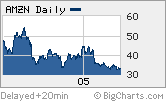 |
| Bearish on books: Shares of Amazon.com have plunged despite strong sales growth on concerns of eroding profit margins. |
|
|
|
|
|
| More about Internet stocks
|
|
|
|
|
NEW YORK (CNN/Money) -
It looks like not even Harry Potter's magic will be enough to save Amazon.com from investors who've grown increasingly bearish about the online retailing business.
The Seattle-based online shopping giant, known mainly for books, reported first-quarter sales that met analysts' expectations and gave guidance for the second quarter and full year that also were roughly in line with Wall Street's consensus estimates.
The company added that it has already received 700,000 pre-orders for the "Harry Potter and the Half-Blood Prince," the sixth book in J.K. Rowling's wildly popular series of adventures about a boy wizard and his friends.
But that didn't please Wall Street, which focused on a 30 percent dip in the company's net income and the prediction that operating income in the second quarter would be lower than a year ago.
There was also some confusion on Wall Street as to whether or not Amazon missed Wall Street's pro-forma earnings targets. The company posted net income of 18 cents per share. Analysts were expecting pro-forma earnings, which exclude certain charges such as taxes and stock options expensing, of 23 cents a share.
But Mark Mahaney, an analyst with American Technology Research, said that after factoring out the effect of tax provisions, it looked like Amazon's pro-forma profit met estimates. David Garrity, an analyst with Caris & Co., said he came up with a pro-forma number of 31 cents per share, ahead of estimates, after excluding stock options costs and taxes. And another analyst who asked not to be named said he calculated a pro-forma number of 22 cents, one penny below consensus.
Still, shares of Amazon (Research) fell more than 4 percent in after-hours trading according to INET, following a 2.5 percent dip in regular trading on the Nasdaq Tuesday. The stock has plunged more than 25 percent so far this year.
Online retailers haven't enjoyed the warm reception from Wall Street that Internet search companies have lately. Shares of Yahoo! (Research) and Google (Research) both surged after reporting better-than-expected results last week.
But online auction leader eBay (Research) dipped slightly even though it also posted a stronger than anticipated first-quarter profit because investors were unimpressed with the company's guidance.
Internet DVD-rental service Netflix (Research) reported a smaller quarterly loss than Wall Street had predicted but its stock tumbled nearly 8 percent due to a lower sales forecast for the year. And Overstock.com (Research), an online retailer of closeout goods, plunged 10 percent after the company reported a wider-than-expected quarterly loss.
Investors appear to have the same concern for most online retailers. In the face of intense competition, are these companies going to have to spend too aggressively in order to attract customers? Getting people in the door and ringing up cash registers is one thing...but running the business at a high enough profit margin to satisfy Wall Street is another matter.
To that end, Amazon said in its earnings report Tuesday that while it expects sales for the second quarter to increase between 18 percent and 25 percent from the same period last year, it also forecast that operating income for the quarter would decline between 7 percent and 42 percent from last year's levels.
There are also concerns about a new program called Amazon Prime hurting profits. The company announced this initiative, which enables customers to get unlimited two-day shipping of purchases for a $79 annual membership fee, in January.
During a conference call with analysts, Amazon chief financial officer Thomas Szkutak said that increased shipping expenses as a result of the Amazon Prime program contributed to the rising cost of sales in the quarter.
Szkutak also made several comments during the call about Amazon's increased commitment to low prices, remarks that sounded eerily like the mantra of Wal-Mart (Research). And while that may be good news for consumers, it might not be for owners of the stock.
"Demand is there but the way the company is positioning itself right now, it's deciding to reward its customers before its investors," Garrity said. "What the company is telling investors is wait until Christmas and the year will be big."
And the analyst who asked not to be named noted that although Amazon reported a 21 percent increase in free cash flow, an important measure of the company's financial health, from a year ago, investors should be alarmed by the fact that free cash flow declined significantly on a sequential basis.
Amazon said free cash flow for the past twelve months was $417 million as of the end of March, down nearly 13 percent from the $477 million in trailing free cash flow it reported at the end of December.
For a look at retailers that lost their customer focus, click here.
For a look at more Internet stocks, click here.
Analysts quoted in this story do not own shares of the companies mentioned and their firms have no investment banking ties to the companies.

|